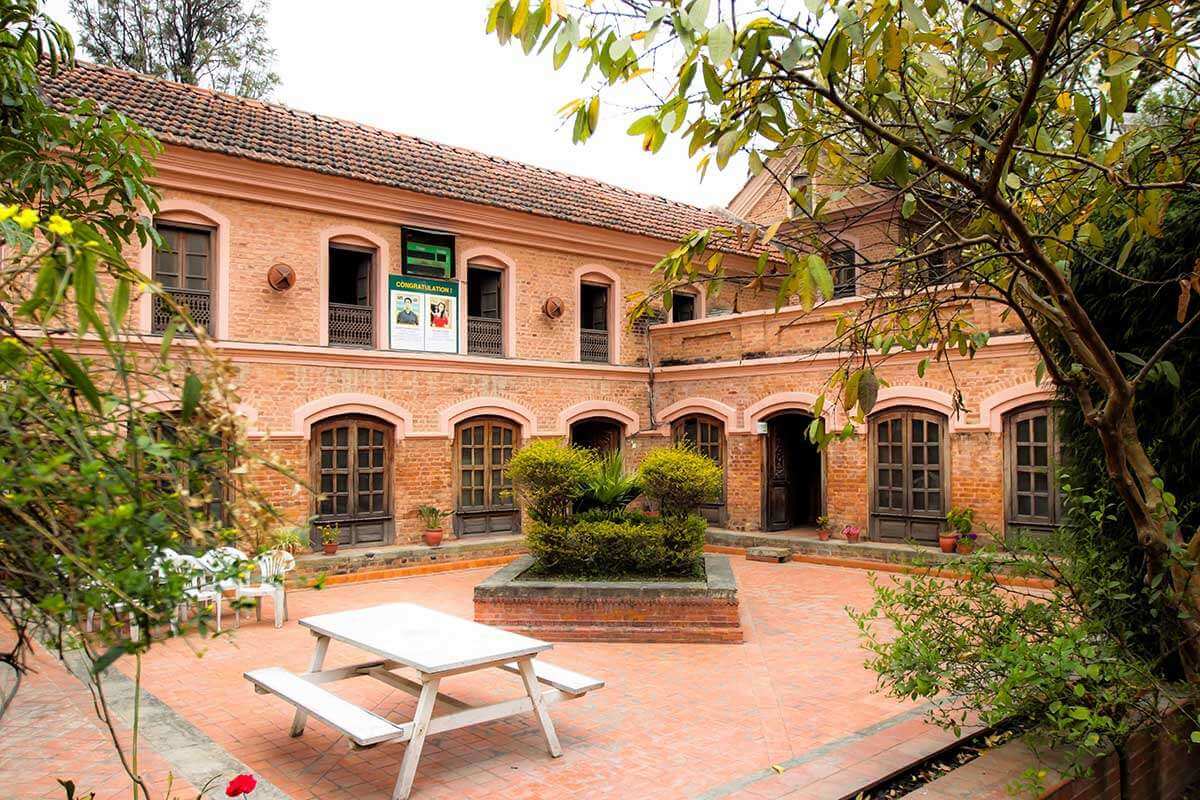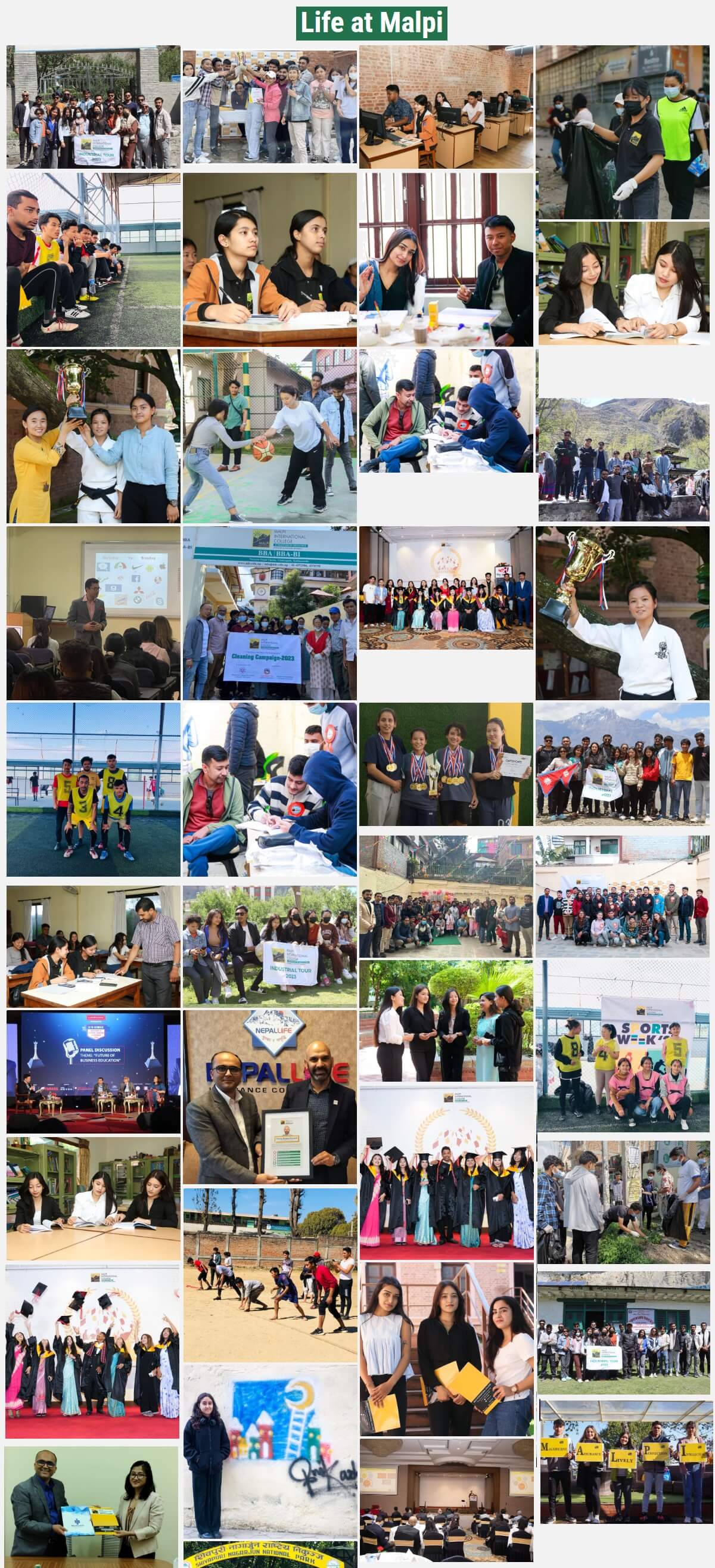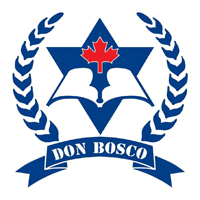Overview
Malpi International College (MIC), established in 1998 and located at Narayan Gopal Chowk, Chakrapath, Kathmandu, is an urban, co-educational institution dedicated to structured business and information technology education under Pokhara University. As an affiliated college, MIC follows approved curricula and academic regulations while integrating systematic exposure to industry, community engagement, and practical learning environments suitable for Nepali and international learners.
The college serves students who seek factual clarity about BBA, BBA (Finance), BCSIT, and MBA programs, with particular emphasis on academic standards, transparent processes, employability skills, and ethical growth. It functions as an institutional platform where parents, students, teachers, policymakers, NGOs/INGOs, and evaluation bodies can access verifiable information on programs, governance, partnerships, and outcomes. The campus culture focuses on discipline, guided mentorship, structured activities, and gradual professional formation rather than promotional claims.

Quick Highlights
-
Established: 1998, Narayan Gopal Chowk, Chakrapath, Kathmandu
-
Affiliation: Pokhara University (PU), Nepal, for bachelor’s and master’s level programs in management and IT (An Official Site of Pokhara University)
-
Programs (current core offerings):
-
Bachelor of Business Administration (BBA)
-
Bachelor of Business Administration – Finance [BBA (Finance)]
-
Bachelor of Computer Systems and Information Technology (BCSIT)
-
Master of Business Administration (MBA)
-
-
Academic Character: Structured management and IT education with course-based, project-based, and internship-based learning
-
Learning Support: Learning Management System, library, computer labs, advisory councils, student-led centers, corporate collaborations
-
Governance Support: Input from professionals across banking, capital markets, hospitality, technology, and entrepreneurship (Synergy Council and advisory bodies)
-
Key Focus Areas: Attitude, Skill, Knowledge (ASK); ethical practice; industry exposure; analytical ability; communication competence; community responsibility
Institutional Identity, Vision, and Affiliation
Legal and Academic Standing
Malpi International College (MIC) functions as an affiliated college of Pokhara University under the approved academic and regulatory framework for management and IT programs. Pokhara University is a public university established under the Pokhara University Act, 1997, with recognized degree structures in BBA, BBA (Finance), BCSIT, and MBA.
MIC follows the academic standards set by Pokhara University. Credit hours, course outlines, evaluation methods, internships, and graduation requirements are based on university-approved guidelines. This alignment helps ensure that students study within a clear legal framework and receive degrees that hold formal recognition in Nepal and abroad.
Vision and Mission
MIC’s institutional direction is guided by a set of practical and student-focused commitments:
-
Building knowledgeable and responsible graduates in business, finance, and IT
-
Linking classroom learning with real organizational settings in Nepal and other contexts
-
Encouraging integrity, critical thinking, clear communication, and social responsibility
-
Following the ASK principle: attitude, skills, and knowledge progressing together in a balanced way
These commitments present MIC as a disciplined and transparent academic environment where rules, expectations, support systems, and learning processes are clearly communicated to students and families.
Academic Programs Offered
Each program below is presented for factual clarity. Exact curricula follow Pokhara University regulations; readers should cross-check any year-specific revisions with official PU and MIC notices. (An Official Site of Pokhara University)
Bachelor of Business Administration (BBA)
The BBA at MIC is a four-year, eight-semester bachelor’s degree focusing on core areas of management, accounting, economics, marketing, finance, human resource management, and business communication.
Key academic characteristics:
-
Credit Load: Approximately 120–126 credits as per PU framework
-
Structure: Foundation courses, core management subjects, quantitative methods, functional specialization opportunities, project work, and internship
-
Learning Focus:
-
Understanding organizational structures and decision processes
-
Financial and managerial accounting competence
-
Marketing analysis, consumer understanding, and communication skills
-
Human resource concepts, basic labor relations, and people management
-
Entrepreneurship exposure through case work and events
-
-
Graduate Profile:
-
Prepared for entry-level roles in banks, corporate houses, NGOs, development projects, and entrepreneurial ventures
-
Able to interpret financial and non-financial information, prepare reports, and participate in structured decision processes
-
Equipped for further study (MBA, professional certifications, specialized master’s degrees)
-
Bachelor of Business Administration – Finance [BBA (Finance)]
The BBA (Finance) program at MIC is structured for students who aim to specialize in banking, insurance, corporate finance, and capital markets under the Pokhara University framework.
Key features:
-
Duration: 4 years, 8 semesters
-
Focus Areas:
-
Corporate finance, banking operations, insurance principles
-
Investment analysis, portfolio concepts, financial institutions and markets
-
Risk management basics and regulatory frameworks
-
-
Academic Components:
-
Core management courses shared with BBA
-
Finance-focused concentration subjects
-
Compulsory internship (6–8 weeks) with reporting and evaluation
-
-
Graduate Profile:
-
Suitable for roles in commercial banks, development banks, insurance companies, investment firms, brokerage houses, and corporate finance departments
-
Prepared for advanced study in finance, risk, investment, and related disciplines
-
Bachelor of Computer System and Information Technology (BCSIT)
BCSIT at MIC follows Pokhara University’s IT and computing framework and responds to the demand for professionals who can function at the intersection of software, systems, and organizational processes.
Core academic orientation:
-
Foundation: Programming, data structures, computer architecture, operating systems, database systems, networks
-
Applied Areas: Information systems, web technologies, basic cybersecurity concepts, software engineering practices
-
Progressive Model:
-
Early semesters build core computing knowledge
-
Middle semesters integrate system development with applied projects
-
Final semesters emphasize advanced projects, part-time roles, and company placements (where available)
-
-
Graduate Profile:
-
Roles in software development, system administration, IT support, information systems analysis, entry-level solution development
-
Readiness for further specialization (e.g., computer science, information systems, data and security fields)
-
Master of Business Administration (MBA)
MIC offers an MBA program under Pokhara University’s trimester system, following continuous evaluation, defined credit distribution, and structured coursework and electives.
Key features:
Duration: Typically 2 years (trimester model), with defined credit completion
Components:
-
Foundation and analytical courses
-
Core courses (marketing, finance, HRM, operations, strategic management)
-
Electives and concentration areas (including finance, marketing, HR, entrepreneurship, and related fields depending on approved structure)
-
Project work, research components, and internships or organizational ties
Target Group:
-
Graduates seeking structured managerial growth
-
Working professionals seeking accredited management qualification within Pokhara University system
Admission Process
MIC follows a transparent admission system aligned with Pokhara University regulations and internal policies. Applicants are encouraged to verify each admission cycle through official notices.
General Procedure (All Programs)
-
Inquiry and Counseling
-
Students or parents contact the college (in-person, call, or official website) to understand eligibility, course structure, fee range, and timelines.
-
Academic counselors explain program suitability based on interests, prior performance, and career direction.
-
-
Application Submission
-
Submission of completed application form with academic transcripts, mark sheets, character certificates, photographs, and copies of citizenship or passport (where applicable).
-
For master’s level: bachelor’s degree documents and other requirements as per PU regulations.
-
-
Entrance and Evaluation
-
Written test and/or interview, as prescribed by MIC and Pokhara University for the respective program.
-
Assessment typically covers English, quantitative ability, logical reasoning, and subject awareness for management or IT.
-
-
Admission Confirmation
-
Merit-based shortlisting considering entrance performance and previous academic records.
-
Seat confirmation after payment of prescribed fees within the stipulated timeline.
-
Basic Eligibility
-
BBA / BBA (Finance) / BCSIT:
-
Completion of 10+2, A-Levels, or equivalent with minimum aggregate as prescribed by Pokhara University (commonly 45% aggregate or 2.0 CGPA, or minimum grade requirements in three A-Level subjects).
-
-
MBA:
-
Bachelor’s degree in any recognized discipline with minimum percentage/CGPA as required by PU, plus successful completion of entrance process. (An Official Site of Pokhara University)
-
Students should always confirm year-specific criteria from MIC and PU official communications, as regulations may be revised.
Teaching Faculty and Learning Methodology
MIC’s teaching approach is built around structured coursework, guided interaction, and applied activities:
-
Faculty pool includes experienced academicians and professionals from banking, insurance, securities, technology, entrepreneurship, and corporate management.
-
Classroom teaching integrates:
-
Case discussions based on local and global business contexts
-
Assignments using real data, policy documents, and organizational reports
-
Presentations, project work, and group tasks that build clarity and confidence
-
-
Continuous assessment combines internal evaluations, presentations, projects, and term-end examinations under Pokhara University rules.
-
Advisory councils and guest resource persons connect classroom content with current practices in markets, finance, IT, and organizational leadership.
The learning environment encourages punctuality, preparation, critical questioning, and responsible conduct rather than passive attendance.
Infrastructure and Learning Facilities
Malpi International College is based at Narayan Gopal Chowk, Chakrapath, Kathmandu, in a dedicated campus building where classrooms, labs, the library, and support services sit within close reach. The layout is simple, which helps students move easily between learning spaces throughout the day.
Key facilities
-
Library with reference materials in management, IT, economics, finance, research methods, and related subjects, along with selected digital resources for coursework and projects.
-
Computer laboratories with internet access and licensed software for programming, analysis, research, and presentations.
-
Classrooms set up for interaction, group work, and use of audio-visual tools where needed.
-
Learning Management System (LMS) used to share syllabi, reading materials, assignments, notices, and feedback in an organized way.
-
Quiet study areas for individual reading and small-group discussions, supporting daily study routines and project work.
-
Cafeteria with simple, hygienic meals and snacks for students and staff.
-
Indoor and outdoor spaces used for sports and activities under relevant campus units.
Quick checklist: how students usually use the campus
-
Start the day: short reading or review in the library or study zone
-
Between classes: check LMS, discuss tasks, meet group members
-
After classes: lab work, consultations, project meetings, exam preparation
Every facility has a defined academic purpose and is used to support teaching, self-study, evaluation, and organized student activities.
Campus Life and Daily Experience
Life at Malpi International College is steady and rule-based, with a clear link between daily behavior and academic progress. The environment is suited to students who prefer clarity, routine, and respectful interaction.
Core features of campus life
-
Co-educational setting where students are expected to work and interact with mutual respect, regardless of background.
-
Orientation at the beginning of the session explaining attendance rules, examination systems, grading patterns, code of conduct, use of LMS, and available support services.
-
Student-led centers and clubs that plan talks, workshops, academic events, visits, and projects under faculty guidance, giving students practical responsibility.
-
Clear expectations on:
-
regular class attendance
-
timely and sincere submissions
-
prepared participation in class and presentations
-
disciplined conduct on and off campus
-
-
Planned visits and interactions with banks, corporate offices, IT firms, and social or development organizations so students can see how classroom ideas function in real workplaces.
Self-check for students
-
Am I present and on time for most classes?
-
Are my assignments complete and submitted without delay?
-
Have I taken part in at least one academic or professional event this term?
Over time, these simple habits help students adjust to the work culture common in banks, offices, firms, and institutions in Nepal and abroad.

Learning Beyond the Classroom (ECA/CCA)
Activities beyond regular classes are planned as part of the learning environment, not as side events. They give students space to apply what they study, speak with confidence, work in teams, and understand social responsibilities.
Key activity areas
-
Sports events and indoor/outdoor games that support physical fitness, discipline, and cooperation.
-
Business idea and project presentation platforms, including entrepreneurship-focused activities supported by dedicated centers.
-
Finance and investment sessions, exposure to capital markets, and guided simulations for learners interested in banking and financial sectors.
-
IT-related events such as coding tasks, project showcases, and technical discussions for technology-focused students.
-
Debates, moderated discussions, and public speaking platforms that strengthen clarity, reasoning, and presentation skills.
-
Community visits and outreach programs with schools, local bodies, and organizations, where students observe local issues, public services, and social needs.
What students typically gain
-
confidence in presenting their work
-
habit of working with peers towards clear goals
-
experience handling real tasks and audiences in a controlled setting
-
better understanding of communities they live and study in
These activities are aligned with academic goals and personal growth and are treated as meaningful extensions of classroom learning.
Scholarships and Financial Support
Malpi International College offers defined scholarship and recognition schemes supported by the institution and its partners. Criteria are announced through official notices to maintain clarity and fairness.
Main scholarship categories
-
Soaltee Academic Excellence Award
-
Malpi Academic Scholarship
-
IJ Foundation Purpose Scholarship
-
RB Foundation ECA/CCA Scholarship
-
Dean’s List recognition under Pokhara University academic standards
Common eligibility points
-
consistent academic performance in SEE, 10+2, or semester examinations
-
constructive participation in extracurricular or co-curricular activities
-
documented involvement in community or social work, where required
Applicant checklist
-
Read the latest scholarship notice for the current intake
-
Confirm coverage, criteria, and deadlines directly from Malpi International College
-
Keep mark sheets, certificates, and supporting documents ready for verification
Since scholarship provisions may change over time, students and parents are encouraged to rely only on updated information issued through official channels.
Student-Led Centers, Synergy Council, and Advisory Bodies
MIC’s structural strength lies in systematic involvement of industry and academic professionals through councils and centers.
Student-Led Centers
Representative centers include:
-
Center for Career Guidance and Placement
-
Center for Entrepreneurship and Innovation
-
Center for Information Technology
-
Center for Banking, Finance, and Insurance
-
Center for Marketing and Digital Excellence
-
Center for Interpersonal and Leadership Development
-
Center for Sports and Hobby
-
Center for Community Collaboration
These centers:
-
Conduct training sessions, workshops, guest lectures, and small projects
-
Support internships and placement coordination
-
Help students practice leadership roles in a supervised academic setting
Malpi Synergy Council and Advisory Panels
The Synergy Council and advisory boards bring together faculty members and sectoral leaders from: banking, microfinance, tourism, private equity, capital markets, technology companies, chartered accountancy, and corporate HR.
Functions include:
-
Reviewing curriculum relevance in line with regulatory guidelines
-
Suggesting activity modules, workshops, and exposure visits
-
Sharing perspectives on ethical standards, compliance, and emerging skills
This structure strengthens institutional accountability and helps align teaching content with current professional expectations without compromising academic independence.
Achievements and Institutional Milestones
Over more than two decades, key milestones include:
-
Continuity in delivering Pokhara University-affiliated management and IT programs
-
Regular organization of finance workshops, investment literacy bootcamps, entrepreneurship competitions, and industry visits
-
Engagement of recognized professionals as contributors, mentors, and advisory members across finance, tourism, technology, and capital markets
-
Development of student-led structures that integrate academic work with responsible practice
-
Formal scholarship schemes announced to support high-performing and motivated students
These achievements are recorded through event archives, official notices, and collaborations accessible via MIC’s official channels.
Role in Local and National Education Landscape
Malpi International College holds a defined position in Nepal’s higher education ecosystem as:
-
An affiliated college under a national university framework (Pokhara University)
-
A provider of structured programs in business, finance, and IT for students from diverse socio-economic backgrounds
-
A collaborator with companies, banks, IT firms, advisory practices, and development actors for exposure, internships, and dialogues
-
A contributor to the development of skilled graduates who remain in Nepal’s institutions or pursue higher studies and employment abroad
For policymakers, researchers, and accreditation teams, MIC offers an observable model of an urban private college working within a regulated affiliation system while engaging with multiple sectors through documented activities.
Why Choose Malpi International College?
This section responds to informational intent, not promotional claims. Prospective students and stakeholders may consider MIC when they seek:
-
Pokhara University–affiliated BBA, BBA (Finance), BCSIT, and MBA programs in Kathmandu under a formal regulatory framework
-
Structured course delivery supported by advisory councils with backgrounds in banking, capital markets, tourism, technology, entrepreneurship, and professional services
-
Integration of classroom study with internships, practical assignments, research projects, and supervised exposure visits
-
Defined scholarship schemes and recognition mechanisms for academic and activity-based achievement
-
A campus culture that highlights ASK (Attitude, Skill, Knowledge), ethics, and accountability alongside technical competence
-
Accessible location at Chakrapath with ICT-supported classrooms, library, computer labs, LMS, and activity centers
Readers are encouraged to compare factual elements—affiliation, curriculum, compliance, faculty strength, and documented outcomes—when evaluating MIC among other institutions.
Message from the Academic Leadership
Public statements and official communications from Malpi International College reflect a clear and consistent approach to student learning and institutional conduct. Malpi International College
Key messages communicated by the leadership include:
-
Steady focus on disciplined study habits and responsible behavior inside and outside the campus.
-
Regular involvement of experienced professionals who help keep course content relevant and interact with students through talks, guidance, and mentoring.
-
Strong belief that attitude, skills, and knowledge should grow together, in line with the ASK principle followed by the college.
-
Expectation that students take part in projects, presentations, internships, and community-related activities as an essential part of their education.
-
Clear stand on honesty in assessments, adherence to regulatory standards, and sharing accurate information with students, parents, and external agencies.
Simple reading for stakeholders:
-
The college states what it does in clear terms.
-
Roles and expectations are documented.
-
It expresses readiness to be observed, evaluated, and held accountable by regulators, accreditors, and partners.
Conclusion
Malpi International College functions as an affiliation-based institution offering management and IT programs under the framework of Pokhara University. Its identity rests on defined values (ASK), clear academic structures, industry exposure, student-led initiatives, and rule-based scholarship opportunities.
Frequently Asked Questions (FAQ)
1. Is Malpi International College officially affiliated with a recognized university?
Yes. Malpi International College runs its management and IT programs under affiliation with Pokhara University, a recognized public university of Nepal established under the Pokhara University Act, 1997. (An Official Site of Pokhara University)
2. Which academic programs are offered at MIC?
MIC offers bachelor-level programs in BBA, BBA (Finance), and BCSIT, and a master’s level MBA program, subject to approval and continuation by Pokhara University. For each intake, applicants should confirm active programs from official MIC notices and the university website.
3. How is the teaching and learning process structured?
Teaching combines scheduled lectures, case discussions, assignments, project work, presentations, and internships as prescribed by Pokhara University curricula. Internal assessments and final exams follow university guidelines. Advisory councils and guest speakers connect modules with organizational practice.
4. What kind of scholarships are available?
Scholarships include merit-based and activity-based schemes such as Soaltee Academic Excellence Award, Malpi Academic Scholarship, IJ Foundation Purpose Scholarship, RB Foundation ECA/CCA Scholarship, and Dean’s List recognition. Each scheme has specific criteria announced by the college for a given intake.
5. How does MIC support internships and placements?
Student-led centers and the Center for Career Guidance and Placement help students secure internships and entry-level roles by coordinating with banks, corporates, IT organizations, and partner institutions. Internships are an academic requirement in relevant programs and are supervised both by faculty and organizational mentors.
6. Is Malpi International College suitable for international or non-Kathmandu students?
Yes. The location at Chakrapath, Kathmandu, accessible transportation, English-medium instruction, Pokhara University affiliation, and structured academic systems make MIC suitable for students from different regions of Nepal and abroad, subject to visa and regulatory provisions. Accommodation assistance may depend on external hostels or local arrangements.
7. Where should stakeholders verify official information?
For accurate and updated information, stakeholders should refer to:
-
Malpi International College official website and official notices
-
Pokhara University official website and faculty regulations
-
Direct communication with the college administration for admission, fees, scholarships, and program status
Contact Malpi International College's administrative office for detailed information on the course, admissions, location, fees, scholarships, facilities, counseling, or eligibility.
Contact Details
Malpi International College
Email Address: mic@mos.com.np
Phone Number: +977-1-4372986, +977-1-4442066 , +977-1-4442067
Website: http://www.mic.edu.np
Location: Narayan Gopal Chowk, Chakrapath, Kathmandu, Nepal















